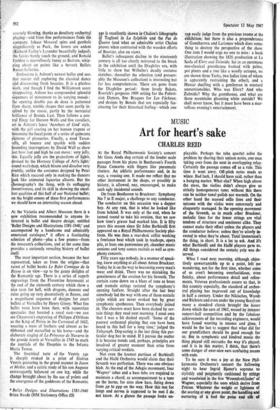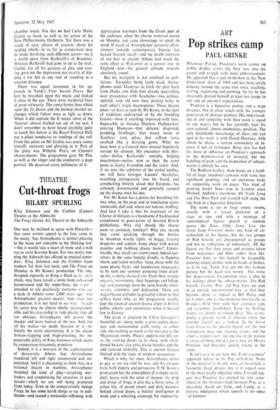Art for heart's sake
MUSIC CHARLES REID
At the Royal Philharmonic Society's concert Mr Geza Anda dug certain of the louder scale passages from his piano in Beethoven's Fourth Piano Concerto with fingers like pneumatic riveters. An athletic performance and, in its way, a rousing one. It made me reflect that no other instrument in the shops, or possibly in history, is allowed, nay, encouraged, to make such ugly incidental sounds.
On from Beethoven to Bruckner: Symphony No 7 in E major, a challenge to any conductor. The conductor on this occasion was a dapper boy. At any rate, that is what he looked like from behind. It was only at the end, when he turned round to take his ovation, that we saw how time's graver had marked him. It is fifty years this season since Sir John Barbirolli first appeared on a Royal Philharmonic Society plat- form. He was then a rear-desk cellist working a freelance beat which took in teashops, opera pits, at least one pantomime pit, chamber music sessions and tony sonata recitals as well as sym- phony concerts.
Fifty years ago nobody, in a manner of speak- ing, knew anything at all about Anton Bruckner. Today he is on the way to becoming every man's meat and drink. There was no mistaking the genuineness of the ovation for his Seventh. The curtain came down on a blaze of tone as brass and tremolo strings restated the symphony's opening fanfare. Straight after the last beat somebody led the way with one of those ecstatic yelps which are never evoked but by great symphonic apotheoses. Then everybody joined in. The cheerers must have been dashed by cer- tain things they read next morning. I must own that I was a bit dashed myself. 'Some of the poorest orchestral playing that can have been. heard in this hall for a long time,' judged the Telegraph. Dog-eating is the last thing this par- ticular dog has in mind. If I pursue the matter it is because trends and, perhaps, principles are involved of greater moment than arise from varying critical verdicts.
Not even the keenest partisan of Barbirolli and the Hall6 Orchestra would claim that their Seventh was perfection. There was one obvious blob. At the end of the Adagio movement, four 'Wagner' tubas and a bass tuba are required to maintain a chord, as accompaniment to a tune on the horns, for nine slow bars, fining down from pp to ppp on the way. How this test for lungs and nerves is supposed to be met I do not know. At a glance the passage looks un- playable. Perhaps the tuba quartet solve the problem by sharing their unison notes, one man taking over from the next in overlapping relay. Certainly the passage comes off as a rule. This time it went awry. Off-pitch notes made us wince. Bad luck, I should have said, rather than a hanging matter. What else? When high above the stave, the violins didn't always give us strictly homogeneous tone; without this there can be neither tonal polish nor warmth. On the other hand the massed cello lines and their unisons with the violas were sonorously and eloquently managed. In the opening movement of the Seventh, as in much other Bruckner, melodic lines for the lower strings are vital tendons of structure and sentiment alike. They cannot make their effect unless the players and the conductor believe; unless they're utterly in- vested in what they're about. Total immersion's the thing, in short. It is a lot to ask. And it's what Barbirolli and the Hall6 players gave us. All things considered the ecstatic yelp was de- served.
What I read next morning, although objec- tively unwarrantable up to a point, left me wondering, not for the first time, whether some of us aren't becoming overfastidious, even finicky, about performance detail and refine- ments. Veteran professionals assure us that, in this country especially, the standard of orches- tral playing has improved out of knowledge in half a century. Under the Nikisches, Woods and Richters and even under the young Beecham many a standard classic brought the house down which the ears of 1967, wooed by intenser concert-hall competition and by the fabulous achievements of the recording engineers, would have found wanting in nuance and gloss. I would be the last to suggest that what did for our grandfathers should be good enough for us. But in symphonic and kindred music the thing played still outranks the way it's played; and it is in this matter, I think, that there's some danger of over-nice ears confusing means with ends.
To be sure it was a joy at the New Phil- harmonia Orchestra's concert the following night to hear Ingrid Bjoner's soprano so stylishly and poignantly cushioned by strings and woodwind in the five 'Wesendonklieder' of Wagner, especially the ones which derive from Tristan. Whatever the weight or lightness of the scoring at any given point, the-handling and nurturing of it had the poise and silk of
chamber music. For this we had Carlo Maria Giulini to thank as well as his artists of the New Philharmonia Orchestra. Yet there was a touch of care, almost of caution, about his reading which—in so far as comparison may be made involving such different scores—set it a world apart from Barbirolli's of Bruckner. Whereas Barbirolli had gone in up to the neck, Giulini, for all his gestures of plea and woo- ing, gave me the impression not exactly of dip- ping a toe but at any rate of standing at a reverent distance.
There was equal reverence in his ap- proach to Verdi's Four Sacred Pieces. But here he breathed upon the music and looked it close in the eye. There were incidental feats of great virtuosity. The canto fermo lines which open the Te Deum and the hushed chordal ex- changes which follow were as light as down. When it did explode the E major onset of the `Sanctus' almost fetched me out of my seat. I don't remember to have heard anything quite to touch this before at the Royal Festival Hall, not a place conducive to rendings of the veil. From this point on Mr Giulini was every ounce himself; extravert and glorying in it. Part of the glory was Wilhelm Pitz's, NP Chorus's chorus-master. The programme gave Mr Pitz, as well as the singer and the conductor, a page portrait. He deserved every millimeter of it.































 Previous page
Previous page